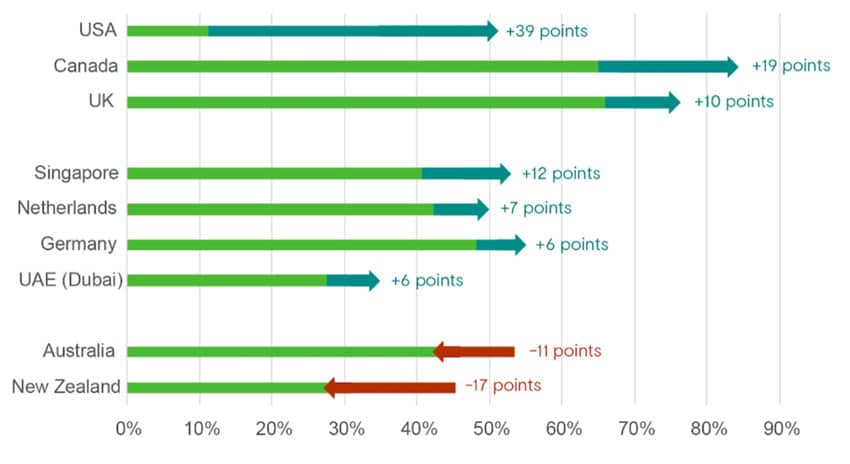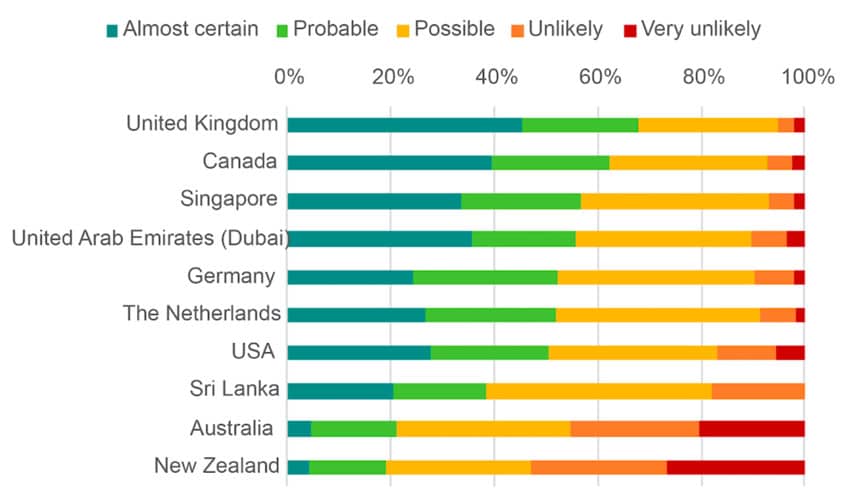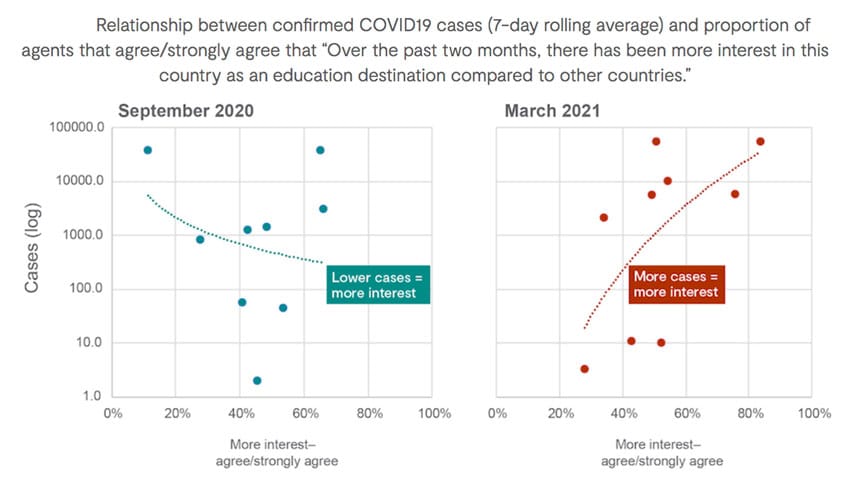Agents report growing demand for study in the US, Canada, and the UK in 2021
- Over the course of a year, Navitas research among agents in over 70 countries has shown how quickly the attractiveness of study abroad destinations can change during COVID
- Agents and students are looking closely at government policies that directly affect students’ ability to travel to a destination to be able to study there and work after graduation
- Demand for the US is rising quickly at the same time as demand for study in Australia and New Zealand is falling
Navitas Insights’ ongoing global research into the perceptions of education agents during COVID shows that the factors influencing agent perceptions and student demand for study abroad in 2021/22 are quickly changing. Government policies directly affecting international students are having a greater impact than each destination’s COVID infection profile – a significant change from 2020.
Navitas first surveyed agents in May of 2020 and then in September 2020. The latest round was conducted in March 2021 and features the largest survey sample: nearly 900 agents in 73 countries around the world. All surveys hinge on Navitas’ aim to discover the extent of the relationship between top destinations’ handling of the pandemic and their attractiveness among agents and students.
Agents were asked about their perceptions of Australia, Canada, Germany, the Netherlands, New Zealand, Singapore, UAE, the UK, and the US.
Positive perceptions of the UK and Canada are increasing, and Germany, the Netherlands, Singapore, and the UAE are also faring relatively well. The US is quickly gaining ground as students renew their demand for the country under President Biden’s leadership. The Australian and New Zealand governments’ commitment to closed borders has made agents progressively unlikely to try to send students to the ANZA region in 2021.
Students are increasingly interested in Canada, the UK, and the US
As you can see from Navitas’ chart below, Canada and the UK continue to gain significant ground in terms of agents’ reports of student interest, and Singapore is also generating more interest. But it’s the US that is the most notable in terms of the speed at which it’s being reassessed by agents. The US has gained a full 39 percentage points in positive perceptions since the previous survey in September 2020.

Australia’s and New Zealand’s success at keeping cases low isn’t enough
Australia and New Zealand have kept their COVID infection rates low in large part because they have had such tight border policies. But the research shows that for the moment, agents and students are not likely to consider them as viable destinations for 2021. More than half of agents in the latest survey said that it is unlikely that students will be able to travel to Australia or New Zealand in the second half of 2021. Looking further ahead, only 28% of agents think it is “almost certain” that travel to these countries will be possible in 2022.

COVID case numbers have become less of a determinant of demand in 2021
Navitas’ analysts have noticed that at this point in their COVID survey programme, there is “a clear decoupling between increasing interest in a given study destination, and the number of cases.” As an example, interest in Canada continues to rise despite this country’s struggles with a third wave of COVID, while interest in Australia and New Zealand is falling despite their low infection rates.

Policies are driving the rise or fall of destinations from survey to survey
As COVID wears on, there are a few things that are happening:
- High case counts are being normalised to a certain degree – they’re losing some of their shock value as wave after wave surfaces in various places;
- The US and the UK have had notable success with their vaccination efforts, which will open the door to more relaxed border restrictions sooner than in some other countries;
- Students are ever-more aware of destinations’ policies towards international students as they look forward to carrying through on their study abroad plans.
Canada is a good example of how much policies are influencing demand. Navitas notes that Canada “allowed existing permit holders to travel into the country after borders were closed, it provided international students with access to the Canada Emergency Response Benefit (CERB), and it communicated openly and positively to international students and their families throughout.” The latest survey also coincided with Canada’s announcement of a new immigration stream for 40,000 international graduates. These policies have clearly not gone unnoticed by agents and students, and they are maintaining student interest despite a slower vaccination rollout in Canada than in the UK and US.
At the same time, Navitas notes that slow visa processing in Canada is likely dampening demand and that if this doesn’t improve, it could be a significant issue for Canadian educators trying to boost their September 2021 intakes.
In the US, meanwhile, President Biden’s decision to let the former administration’s ban on H-1B visas expire sent “a signal to the world that international students are welcome in the US.” Navitas says that the strong negative sentiment about the US in 2020 among students “has dramatically fallen away” under President Biden.
The US has gained tremendous ground from the first survey to the latest on the counts of being welcoming and for handling COVID well. As an indication of how quickly a destination’s image can change, Navitas notes that,
“The proportion of agents reporting improvement in the reputation of the USA as safe and stable almost quadrupled from 10% to 39% between September and March. Even more impressive is the USA’s reputation for being open and welcoming which saw an almost five-fold increase from 11% in September to 51% in March.”
The UK’s vaccination rollout is clearly impressing agents and international students. Navitas says, “The most dramatic improvement over the last three surveys has been the agents’ rating of the UK government’s handling of the pandemic. The UK’s rating rose from 30% in May 2020, to almost 60% in September 2020, to 60% in March 2021.”
Linked to that vaccination rollout is a growing belief that students will be able to travel to the UK relatively soon:
“As of March 2021, agents continue to show strong optimism about the ability to travel to the UK in the coming 12 months; 45% per cent were ‘almost certain’ that international students would be able to travel to the UK in the second half of this year, and 64% in the first half of 2022. The fact that the UK leads all other destinations on these measures is a significant advantage given that various other reports are indicating a strong willingness amongst students to switch destinations in order to travel and commence studying face-to-face (QS).”
In Australia and New Zealand, educators’ ability to attract international students in 2021 is unfortunately looking weak because of closed borders. Despite the excellence of programming in these countries and the beautiful landscapes that are normally such a huge draw for international students, there is little that can be done to stoke international student demand when agents and students know that there is but faint hope of travelling there in 2021.
Elsewhere, UAE, Germany, Netherlands, and Singapore look poised to be able to attract students in 2021 as a result of steadily improving perceptions among agents. Their policies directly affecting international students will be the determinant of how much demand will translate into enrolments.
For additional background, please see:


















